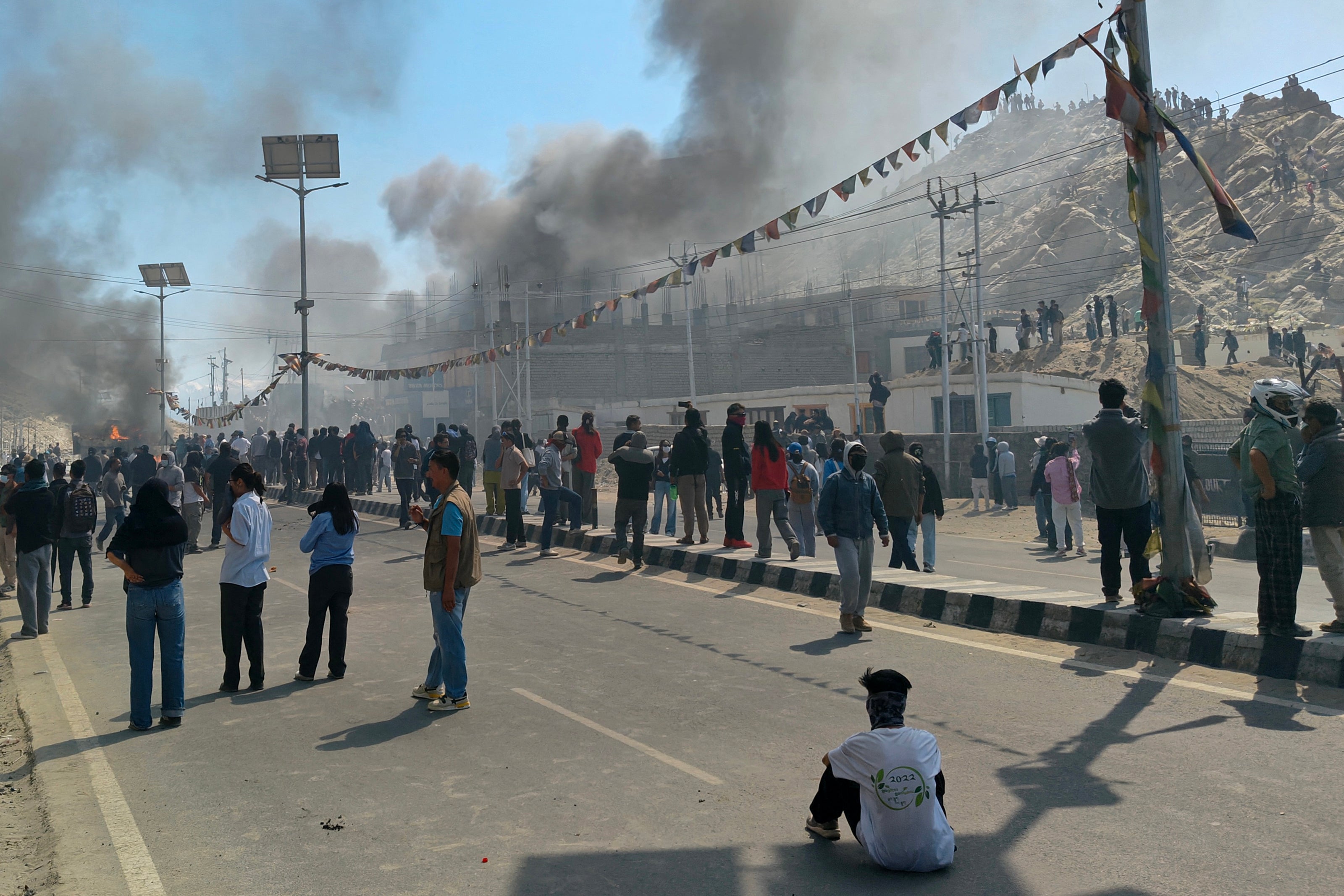Security forces imposed curfew in India’s northernmost Himalayan region of Ladakh after rare protests turned deadly, killing at least five people and injuring almost 80.
The unrest in the usually calm high-altitude cold desert region began on Wednesday over demands for statehood and job quotas.
It marked a rare outbreak of widespread violence in a strategic region bordering China.
Simmering tensions escalated after statehood-seeking protesters on a hunger strike fell seriously ill and were hospitalised in Leh, the federal territory’s main city.
Public anger over the government’s apparent neglect of the hunger-striking protesters and their demands quickly turned into violent protests, with the agitators setting fire to vehicles and the local office of the BJP, the party of prime minister Narendra Modi, and clashing with the security forces.
Police fired tear gas and swung batons at the demonstrators, injuring dozens of them.
On Thursday, security forces patrolled the streets while shops and businesses stayed shut due to the curfew.
Authorities prohibited the assembly of more than five people in Leh as well as Kargil, the other major population centre of Ladakh.
Chering Dorjay, a co-chairman of the Leh Apex Body, the main group fighting for Ladakh’s regional autonomy, said five protesters had been killed so far and many critically injured.
The Indian home ministry said more than 30 police and military personnel had been injured in the clashes, adding that “self-defence firing” had resulted in “some civilian casualties”.
Tensions over the demand for statehood for Ladakh had been simmering since it was split away as a federal territory from Jammu and Kashmir, the remnant of which was stripped of statehood as well as its semi-autonomy by the Modi government in 2019.

While Kashmir has largely been silenced through a crackdown on any form of dissent and a slew of new laws, Ladakh has seen the demand for political rights intensify after short-lived celebrations over being separated from Jammu and Kashmir.
Full statehood for Ladakh would grant it significantly greater political autonomy. It would gain its own elected assembly and state government, allowing the people to make laws and policies.
In the wake of the violence, the Indian government accused climate activist Sonam Wangchuk, one of the prominent protesters on hunger strike, of inflaming tensions.
"In spite of many leaders urging him to call off the hunger strike, he continued with it and misled the people through provocative mentions of Arab Spring-style protest and references to Gen Z protests in Nepal," the home ministry said in a statement. "A mob motivated by his provocative speeches left the venue of the hunger strike and attacked a political party office as well as the government office ... It is clear the mob was guided by Sonam Wangchuk through his provocative statements.”
In a video message on Wednesday, Mr Wangchuk urged his supporters to “stop the violence forthwith as it only causes harm to our cause and further deteriorates the situation”.
“We do not want instability in Ladakh and the country," he said and ended his 15-day fast.
The violence was the worst in Ladakh in decades and signalled waning patience with the Indian government. Many people in Ladakh initially welcomed the 2019 changes that divided Jammu and Kashmir, but celebration soon gave way to fears of land grab, loss of trade, and damage to the region’s fragile ecosystem.
Ladakhi representatives have held several unsuccessful rounds of talks with Indian officials. Another meeting is scheduled for 6 October.
Ladakh's sparsely populated villages have suffered from India’s territorial disputes with China as well as the effects of climate change, including floods, landslides and droughts.
The region’s thousands of glaciers have receded at an alarming rate, threatening the water supply. Pollution contributing to the melting has worsened due to the region’s militarisation, which has intensified since 2020 following a deadly standoff between Indian and Chinese forces along the border.
Typhoon Ragasa weakens in Vietnam after leaving trail of destruction across China
China’s new visa opens doors for foreign talent just as Trump tightens H-1B rules
Pakistani teenager sentenced to 100 years in prison for killing family over PUBG game
Officer who arrested Shah Rukh Khan’s son sues over portrayal in Netflix show
Indian politician who appeared on TV ‘without trousers’ wants to sue
Aishwarya Rai leads Bollywood fight against deepfakes in personality rights lawsuit


.jpg?w=600)




